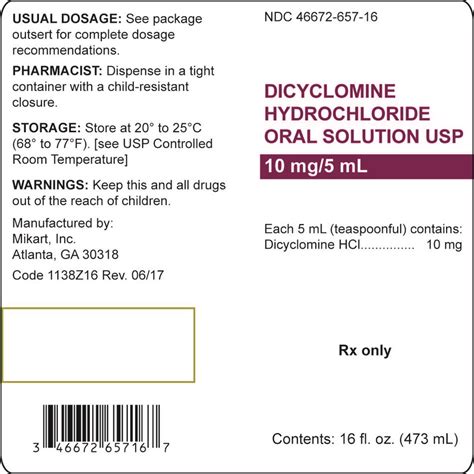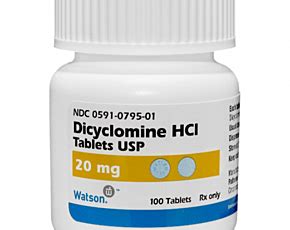Intro
Dicyclomine side effects include drowsiness, dry mouth, and constipation, with rare cases of urinary retention, blurred vision, and tachycardia, affecting digestive health and nervous system function.
Dicyclomine is a medication that is commonly used to treat certain gastrointestinal disorders, such as irritable bowel syndrome (IBS). It works by relaxing the muscles in the stomach and intestines, which can help to alleviate symptoms such as abdominal pain, cramping, and diarrhea. However, like all medications, dicyclomine can cause side effects in some individuals. In this article, we will discuss the potential side effects of dicyclomine, as well as its benefits and risks.
The importance of understanding the side effects of dicyclomine cannot be overstated. While the medication can be effective in managing IBS symptoms, it can also cause a range of adverse effects, from mild to severe. By being aware of these potential side effects, individuals can take steps to minimize their risk and ensure that they are using the medication safely and effectively. Additionally, understanding the side effects of dicyclomine can help individuals to make informed decisions about their treatment options and to communicate more effectively with their healthcare providers.
Dicyclomine is a type of anticholinergic medication, which means that it works by blocking the action of a neurotransmitter called acetylcholine. This neurotransmitter plays a key role in the functioning of the digestive system, and blocking its action can help to relax the muscles in the stomach and intestines. However, anticholinergic medications like dicyclomine can also cause a range of side effects, including dry mouth, blurred vision, and constipation. In some cases, these side effects can be severe and may require medical attention.
Common Side Effects of Dicyclomine

Rare but Serious Side Effects
In rare cases, dicyclomine can cause more serious side effects, including urinary retention, confusion, and hallucinations. These side effects are usually seen in older adults or in individuals who are taking high doses of the medication. They can be severe and may require medical attention. In some cases, they may be a sign of an underlying medical condition, such as a urinary tract infection or a neurological disorder.Benefits of Dicyclomine

How Dicyclomine Works
Dicyclomine works by blocking the action of acetylcholine, a neurotransmitter that plays a key role in the functioning of the digestive system. By blocking the action of this neurotransmitter, dicyclomine can help to relax the muscles in the stomach and intestines, which can help to alleviate symptoms such as abdominal pain, cramping, and diarrhea. The medication is usually taken orally, and it is absorbed quickly into the bloodstream. It can start to work within 30 minutes to 1 hour, and its effects can last for several hours.Risks and Precautions

Interactions with Other Medications
Dicyclomine can interact with a range of other medications, including antacids, acid reducers, and blood thinners. These interactions can increase the risk of side effects or reduce the effectiveness of the medication. Individuals who are taking dicyclomine should inform their healthcare provider about all the medications they are taking, including prescription and over-the-counter medications, vitamins, and supplements.Prevention and Management of Side Effects

Monitoring and Follow-Up
Individuals who are taking dicyclomine should be monitored regularly by their healthcare provider to check for signs of side effects or interactions with other medications. They should also be followed up regularly to assess the effectiveness of the medication and to adjust the dose as needed. In some cases, the healthcare provider may recommend alternative treatments or therapies, such as cognitive-behavioral therapy or relaxation techniques, to help manage symptoms and improve quality of life.Conclusion and Final Thoughts

Future Directions
Future research is needed to fully understand the benefits and risks of dicyclomine and to develop new treatments for IBS and other gastrointestinal disorders. This research should focus on the development of new medications and therapies that are safe, effective, and well-tolerated. It should also focus on the identification of biomarkers and other predictors of treatment response, which can help healthcare providers to personalize treatment and improve outcomes.What are the common side effects of dicyclomine?
+The common side effects of dicyclomine include dry mouth, dizziness, and blurred vision. These side effects are usually mild and temporary, and they may resolve on their own with continued use of the medication.
Can dicyclomine cause serious side effects?
+Yes, dicyclomine can cause serious side effects, including urinary retention, confusion, and hallucinations. These side effects are usually seen in older adults or in individuals who are taking high doses of the medication.
How can I prevent and manage side effects of dicyclomine?
+Individuals who are taking dicyclomine can prevent and manage side effects by staying hydrated, eating a balanced diet, and getting regular exercise. They can also try sucking on sugar-free candy or chewing sugar-free gum to stimulate saliva production and reduce the risk of dry mouth.
We hope this article has provided you with a comprehensive understanding of the side effects of dicyclomine. If you have any further questions or concerns, please do not hesitate to comment below or share this article with others who may be interested. Additionally, if you are experiencing any side effects or have concerns about your treatment, please consult with your healthcare provider for personalized advice and guidance.
